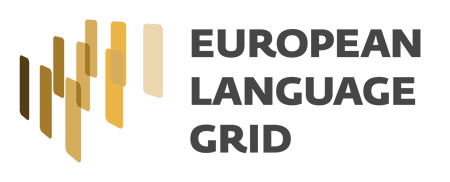Latest News
- New LRs in the ELRA Catalogue July 25, 2024
- New LRs in the ELRA Catalogue June 5, 2024
- New LRs in the ELRA Catalogue Dec. 7, 2023
- New LRs in the ELRA Catalogue Nov. 13, 2023
- The LDS vision by Philippe Gelin Oct. 17, 2023
European Language Grid

With 24 official EU and many more additional languages, multilingualism in Europe and an inclusive Digital Single Market can only be enabled through Language Technologies (LTs). European LT business is dominated by thousands of SMEs and a few large players. Many are world-class, with technologies that outperform the global players. However, European LT business is also fragmented – by nation states, languages, verticals and sectors.
Likewise, while much of European LT research is world-class, with results transferred into industry and commercial products, its full impact is held back by fragmentation. The key issue and challenge is the fragmentation of the European LT landscape.
The main objective of the project is to address fragmentation in European LT business and research by establishing the European Language Grid as the primary platform for Language Technology in Europe and to strengthen European LT business with regard to the competition from other continents. The project will design, develop, deploy and populate the ELG as a platform for commercial and non-commercial Language Technologies alike, both functional (running services and tools) and non-functional (data sets, resources, models). Using the ELG (a) to identify, find, discover, obtain and integrate LT services, data sets and resources as well as (b) to contribute to and make available LT services, data sets and language resources through the ELG will create a multitude of benefits for companies using and/or providing LTs as well as for non-commercial, academic organisations.
It will enable the commercial and non-commercial European LT community to deposit and upload their technologies and data sets into the ELG, to deploy them through the grid, and to connect with other resources. The ELG will boost the Multilingual Digital Single Market towards a thriving European LT community, creating new jobs and opportunities. Through open calls, up to 20 pilot projects will be financially supported to demonstrate the usefulness of the ELG. The proposal is rooted in the experience of a consortium with partners involved in all relevant initiatives.
Based on these, 30+ national competence centres and the European LT Board will be set up for European coordination. The ELG will foster “language technologies for Europe built in Europe”, tailored to our languages and cultures and to our societal and economical demands, benefitting the European citizen, society, innovation and industry.
ELDA will be strongly involved in the Grid Content, namely in the WP5 pertaining to Language Resources, Data Sets and Models that will address the identification and collection of LRs, the legal support, the creation of a Data Management Plan, etc.
The ELG consortium comprises nine partners with complementary profiles and a very strong and deep technology background and long experience in the area of Language Technology, which is at the core of the European Language Grid.
Most of them have been successfully involved in past projects such as, among others, META-NET, QT21, ELRC, CRACKER, PHEME and FREME. All partners have been involved in the wider Multilingual Europe community for almost ten years under the umbrella of META-NET, which was initiated by DFKI in 2010.
ELDA has also been involved in many different EU projects such as Panacea and MLi, and currently belongs to the ELRC Consortium.
 ELG Team
ELG Team